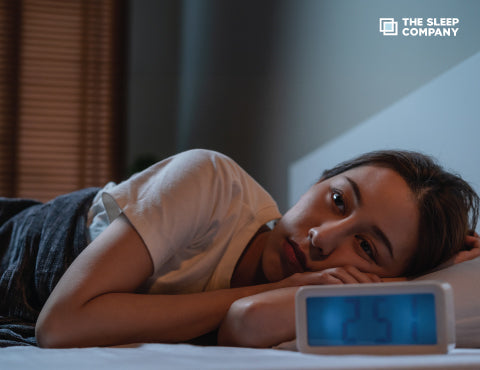My Cart

How To Tackle Your Sleep Issues In 2024

Do you spend your nights tossing and turning unable to relish a sweet slumber?
Feeling wide awake in the middle of the night when the world is enjoying a shut-eye is definitely not how you want to spend your nights. This leads to groggy mornings that just hamper your productivity. And in the long run, it is not good for your overall health.
Why does this happen to you? The reasons can be plenty. Maybe it is your overstimulated mind or even poor sleep habits that can be the culprit.
But you don’t have to worry about anything. Even if sleep feels like a tedious chore, we are here to make it easier for you. Ahead, we bring you tried and tested secrets on how you can tackle your sleep issues in 2024. Let’s get started.
13 Tips To Tackle Your Sleep Issues In 2024
Imagine this! You are suddenly able to enjoy seven hours of sound sleep and wake up with a smile on your face. Sounds perfect, doesn’t it? Well, these tips can help you out and do just that!

1. Relax Your Mind With Breathing Exercises
"Practicing deep breathing exercises before bedtime helps activate the body's relaxation response. This is why it makes you feel calm and fall asleep faster."
One of the most common reasons why sleep eludes us is our overactive brain. A calm mind is correlated to a good night’s rest.
So, to make it easier, you can try Dr. Andrew Weil’s 4-7-8 breathing technique to combat your sleep issue. It was created to help you relax and calm your nerves. Here’s how you do it:
- Get comfortable on your mattress, turn off the lights, and make sure the temperature of your room is ideal.
- Now, close your eyes and place your tongue on the roof of your mouth. This is how it should be for the entire duration of the exercise.
- Keep your mouth closed and take a deep breath through your nose as you count to four.
- Next, hold your breath as you count from one to seven.
- Finally, exhale through your mouth.
You can do this 3-5 times before bed to help you relax. It is easy and doesn’t require any additional equipment. However, make sure you concentrate on your breathing throughout the exercise and nothing else.
2. Keep Your Tech Away
"Prolonged elevated levels of cortisol are not good and can have negative effects on health, including impaired immune function, weight gain, and disrupted sleep patterns."
After a long tiring day, we all enjoy losing ourselves to entertainment. It can be a new movie on Netflix or simply scrolling through the Gram. But, this can lead to sleep issues. An easy solution is to switch it off at least an hour before you hit the sheets.
Why?
For one, there is a sense of anxiety attached to staying connected all the time. This leads to waking up to check your notifications, hampering your sleep.
Second, the blue light from LED-based devices increases the release of cortisol in the brain. Also known as the stress hormone, it makes you more alert. And this is not something you want before you snuggle into your mattress. So, bid adieu to your electronics an hour or two before your sleep time. Easy!
3. A Warm Shower Before Bed
"A warm bath not only relaxes your muscles and relieves stress but also enhances the body's ability to absorb oxygen."
A bath can be super relaxing. It lets you wash away all the stress from the day and leaves you fresh and ready for bed.
However, according to a study, it was seen that the water temperature should be between 104 to 108.5 degrees Fahrenheit. This works because the warm water stimulates blood flow and keeps your body cool. That said, take a hot bath at least two to three hours before bed.
So, the next time you are struggling with sleep issues, maybe a hot bath will fix it.
4. Meditate Before You Sleep
"Regular meditation can physically change the brain by increasing gray matter in areas associated with memory, self-awareness, and compassion."
Some love meditation while others seem to hate or disregard it. But no matter which group you belong to, if sleep issues have been bothering you, meditation can be a great idea.
Today, there are myriad meditation techniques, each one better than the other, from mindfulness body scan to guided meditation. So, it may require a bit of trial and error until you figure out which works for you.
When you start meditation, it helps you achieve a sense of inner calmness. All the noise in your mind becomes silent, which lets you fall asleep easily. Infact, it reduces the production of cortisol and increases melatonin (sleep hormone) levels naturally.
5. Visualization Can Be Helpful
"Engaging in sleep visualization, where you mentally picture a serene scenario, activates the same brain regions as when you are actually experiencing that peaceful moment."
Visualization is a powerful technique that you can use to overcome sleep issues or even anxiety. It is almost like daydreaming. But here, you imagine your happy place, something that relaxes you and fills you with a sense of peace. It can be anything, such as sitting by the ocean and watching the waves or simply seeing yourself in your favorite room.
To begin visualization, get into your mattress and take your comfortable sleep position. Relax your body and take deep breaths. Finally, start imagining yourself in your happy place. There are also guided visualization videos on YouTube that can help you out.
6. Have A Proper Bedtime Routine
"Having a pre-sleep routine, such as reading a book, listening to music, or taking a shower sends a signal to the brain that it’s time to wind down. However, you must follow the same pre-sleep routine every day"
When we were young, our parents and grandparents would always tell us to be early to bed and early to rise, even on Sundays. And we were left craving those extra hours of sleep. But, they actually had a point.
A consistent routine signals to your body that it's time to wind down, helping to relax your mind and reduce stress or anxiety that may contribute to sleep disturbances. It also regulates your body’s internal clock, promoting the natural sleep-wake cycle.
All you have to do is go to bed and wake up at the same time, even on weekends and holidays. This leads to quality sleep and takes care of your overall well-being.
7. Prepare Your Room For Sleep
"Even a small amount of light can disrupt melatonin production and adversely affect sleep quality"
Wondering how do you prepare your room for sleep? Well, it’s quite simple actually. All you have to do is create a tranquil sleep environment. Dim the lights and make sure the temperature of the room is cool for at least 30 minutes before your slumber.
Next, make sure your space is clutter-free, including your mattress. Block out any outside noise by closing windows and keep the curtains closed as well to prevent outside light from pouring in. This gets your space ready for sleep.
8. Invest In A Comfy Mattress
"We spend one-third of our lives on a mattress. Therefore, a high-quality and comfortable mattress is imperative."
When it comes to sleep, your support system here is a mattress. Therefore, it is always ideal to upgrade your sleep with the best mattress.
A supportive mattress like an orthopedic mattress can alleviate sleep issues like back pain and discomfort. Look for one that suits your preferred firmness level. However, the end goal is to opt for the best mattress that ensures optimal spinal alignment.
For instance, The Sleep Technology brings you the coziest orthopedic mattress called the Smart Ortho Mattress. Designed with their patented SmartGrid Technology, this medium-firm mattress offers exquisite comfort.
Also, understand your sleeping preferences and consider factors like motion isolation if sharing the bed.
Remember, investing in the best mattress is an investment in your well-being and helps tackle sleep issues.
9. The Right Pillows Are A Must
"The optimal lifespan of a pillow is about 1-2 years. Over time, pillows accumulate dust mites and allergens and lose their support. This impacts sleep quality."
Pillows are almost like supporting actors but crucial to the script! When you have the right pillow by your side, it can significantly improve the quality of your sleep.
Opt for a pillow that aligns with your preferred sleep position, providing proper neck and spine support.
The Smart Hybrid Pillow from The Sleep Company eases pressure points and reduces discomfort.
If you are a side sleeper, consider a thicker pillow, while back sleepers may benefit from a medium-firm option.
Stomach sleepers should choose a softer pillow to prevent neck strain. Look for hypoallergenic materials if allergies are a concern. Investing in a suitable pillow offers comfort and lets you rest without any hassles.
10. Play Relaxing Music
"Slow-tempo classical music with a gentle melody and low volume is often recommended for creating a calming atmosphere for sleep."
Music can be your ideal sleep companion. In a study, it was seen that those who listened to 45 minutes of music before going to bed enjoyed better sleep quality compared to those who didn’t.
Infact, music decreases the time taken to fall asleep. In another study, it was seen that women who were suffering from insomnia played music before bed for 10 consecutive nights. Before, it would take them anywhere between 27 to 69 minutes to fall asleep. However, after including music in their nightly routine, it only took them 6 to 13 minutes. But make sure the music you choose is soothing and doesn’t have the opposite effect.
11. Try Journaling
"Expressive writing in a journal can reduce stress, improve mood, and even boost the immune system."
You can combat sleep issues with a nightly journaling ritual. Write your heart out.
Before bedtime, grab a notebook and jot down your thoughts, worries, or gratitudes. Reflect on the day's achievements and challenges. This process helps declutter your mind and gets rid of any lingering anxiety.
Write down any upcoming tasks or concerns, releasing them onto paper. As you close the journal, leave your stress on the pages and let your mind unwind. Consistent journaling establishes a calming pre-sleep routine, promoting relaxation and improving overall sleep quality.
12. Watch What You Eat
"Heavy and spicy foods close to bedtime can lead to discomfort and indigestion. These types of foods may also cause acid reflux or disturb your digestive system, making it harder for your body to settle into a restful sleep"
Have you ever enjoyed a heavy meal at night but then struggled to fall asleep? That’s why it is imperative to focus on what you eat, especially at night. Even if you are craving a snack late at night, choose something that's sleep-friendly like banana.
You can also try magnesium-rich foods such as leafy greens and nuts as they are known to help you relax. Avoid excessive sugar intake to prevent energys, almonds, or whole-grain crackers spikes.
Drink enough water but minimize fluid intake so it doesn't lead to frequent bathroom breaks.
13. Limit Alcohol and Caffeine
"If you enjoy coffee, you can also go for a decaffeinated java before bed."
To tackle sleep issues, it is important to restrict the intake of alcohol and caffeine.
A glass or two of wine may initially make you feel drowsy, but it disrupts the later stages of sleep. This causes restlessness and you wake up groggy.
Always limit alcohol consumption at least a few hours before bedtime and avoid caffeine in the afternoon and evening. If you enjoy a drink before bed, opt for soothing alternatives like herbal tea or warm turmeric milk before sleep.
The Final Word
These are some of the best ways to tackle sleep issues in 2024 to unleash a healthy you. However, even after you have tried a few tips, if sleep still eludes you, it may be time to change your mattress.
On average, a mattress lasts anywhere between 7 to 10 years. And then, it isn’t able to offer the same support as before. Lumps, tears, bad odor or waking up with aches and pains are signs that you must invest in a new mattress.
With 100 trial nights, 10-year warranty, patented SmartGrid Technology, and so much more, The Sleep Company’s mattress is the best step you can take to tackle your sleep issue. So, upgrade your sleep experience today for exquisite comfort!




















































